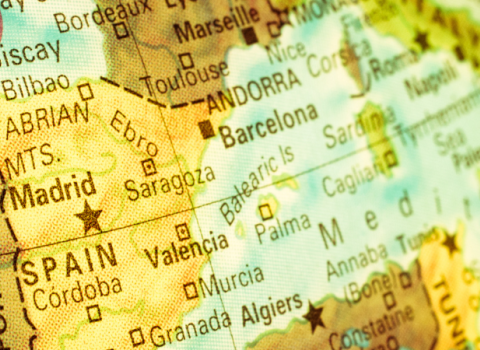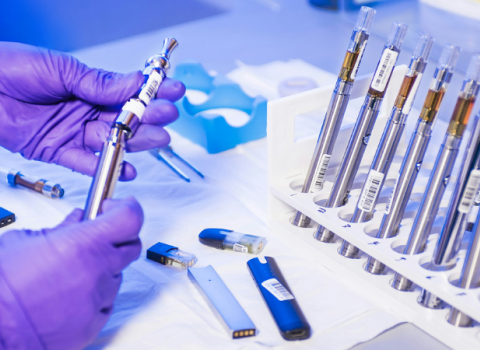Strict regulatory requirements for nucleic acid synthesis screening will support the sector, say industry insiders

James Diggans, vice-president for policy and biosecurity at Twist Bioscience (left) and Wladimir Labeikovsky, head of data operations and co-founder of Ribbon Bio (right).
The enhanced ability to synthesise DNA, RNA and peptides has transformed biotechnology, enabling tremendous advances in medicine, agriculture and manufacturing. However, unverified access to certain synthesised nucleic acids could lead to the deliberate or accidental misuse of biological materials by malicious or careless actors. Such misuse can endanger human, animal and plant health.
Knowing what is being ordered and by whom is essential for safeguarding biotechnology. Similar safeguards exist for ordering dangerous chemicals and other hazardous substances; policymaking frameworks need to keep up with technology advances so that safe innovation remains at the heart of the biotech industry.
Screening is becoming increasingly urgent. AI tools are increasingly lowering technical barriers, potentially enabling those with modest expertise to design concerning sequences. This makes comprehensive screening even more vital: by establishing screening as a norm across commercial providers, Europe can help create regulatory clarity and simplification for an industry that has huge potential for growth in Europe.
Handled properly, sequence screening is an enabler of trade, innovation access and security. Within the synthetic biology community, there are existing norms and strong support for a common approach for screening. Industry has urged policymakers to prioritise robust, harmonised standards that safeguard security, foster innovation and reinforce Europe’s sovereignty in a rapidly evolving sector. At a time when trust in science is waning, we need to be proactive.
The fragmentation threat
The policy landscape in Europe for nucleic acid synthesis is inconsistent. Some countries aim to reach emerging and evolving international standards, while others choose not to engage at all. France, for example, introduced a register of microorganisms and toxins, known as the MOT regulation, in 2023. But the Netherlands, home to several emerging synthetic biology companies, does not have an overarching policy in place. And all countries will need to engage with advancing rules from the UK and US.
The possibility of having 27 disparate regulatory frameworks within the Single Market highlights the necessity for EU-wide rules, presenting a clear opportunity to foster an industry grounded in safe innovation. Without a unified approach, Europe risks lagging behind global competitors, undermining its sovereignty and leaving supply chains vulnerable.
Taking action is also likely to further incentivise international action to ensure standards develop in sync with other countries with strong biotech and synthesis screening industries. By establishing clear, enforceable EU-wide screening requirements now, when the US and UK are also developing their frameworks, Europe can shape emerging international norms rather than follow them.
Without this effort, the EU risks missing the window of opportunity to set up its growing synthesis screening industry in a way that will inspire confidence across the world. It is not inconceivable that such standards will become an important part of trade and security agreements in future. The current, fragmented EU approach weakens the bloc's collective voice in international standard-setting and creates regulatory arbitrage that benefits neither European security nor European industry.
EU governments should work together to update and clarify export and import licensing rules for materials such as synthetic DNA. Divergent and burdensome procedures create loopholes, delays, and discourage compliance, while inconsistent requirements across jurisdictions add further uncertainty.
High-level government-to-government coordination as well as leveraging existing frameworks like the Australia Group is needed to streamline and modernise licensing systems. Aligning these with international screening standards and trade rules would strengthen security, reduce administrative burdens and provide legal certainty, while reinforcing Europe’s leadership in biosecurity and safeguarding its biotechnology sector’s competitiveness.
Companies want consistency
At the company level, stakeholders desire clarity and consistency across jurisdictions. When only some companies screen, the playing field is uneven, risking the creation of an incentive to cut corners. Members of the International Gene Synthesis Consortium (IGSC) produce the majority of all gene synthesis globally, and these companies, including those who manufacture benchtop synthesis devices, show their commitment to consistent standards by pledging voluntarily to carry out customer and sequence screening.
Many implement this using automated solutions offered by established defence contractors, venture-backed startups, and independent nonprofits. But while the IGSC has built a community of tools, best practice and data resources, the IGSC alone is not enough. Many companies have yet to join IGSC, and there is no mechanism to enforce good practice amongst its members. There is a need for common, coordinated, enforceable standards.
The EU Biotech Act offers an opportunity to support harmonisation of standards for EU based synthetic biology practitioners.
To take advantage of this opportunity, first, the EU should strengthen standards by developing clear guidance tailored for small and medium-sized enterprises and large companies alike, and align with and advance internationally recognised standards.
Second, the EU can integrate a requirement for screening in licensing, procurement and oversight mechanisms. For example, the next Framework Programme for research and innovation could tie compliance to research funding, providing a strong incentive for adoption. A similar requirement was put in place by the US in its 2024 Framework for Nucleic Acid Synthesis Screening; action here by the EU would support the expectation of responsible screening as a global norm.
Third, the creation of a European Biorisk Expert Group would enable ongoing surveillance of emerging threats, especially at the AI–biology interface.
There are many opportunities for policy and governance to remain agile as biotech capabilities advance. Adopting harmonised, enforceable DNA synthesis standards will safeguard responsible innovation, strengthen supply chains, level the playing field and uphold Europe’s sovereignty in a vital global sector. Without coordinated, enforceable standards, Europe risks falling behind global competitors.
As leaders dedicated to responsible biotechnology, now is the time for decisive leadership. Europe’s future in responsible biotech depends on it.
James Diggans is vice-president for policy and biosecurity at Twist Bioscience in the US. Wladimir Labeikovsky is head of data operations and co-founder of Ribbon Bio in Austria. Both companies are part of the International Gene Synthesis Consortium, an industry-led group formed in 2009 that has been calling on governments to align screening standards.





 A unique international forum for public research organisations and companies to connect their external engagement with strategic interests around their R&D system.
A unique international forum for public research organisations and companies to connect their external engagement with strategic interests around their R&D system.